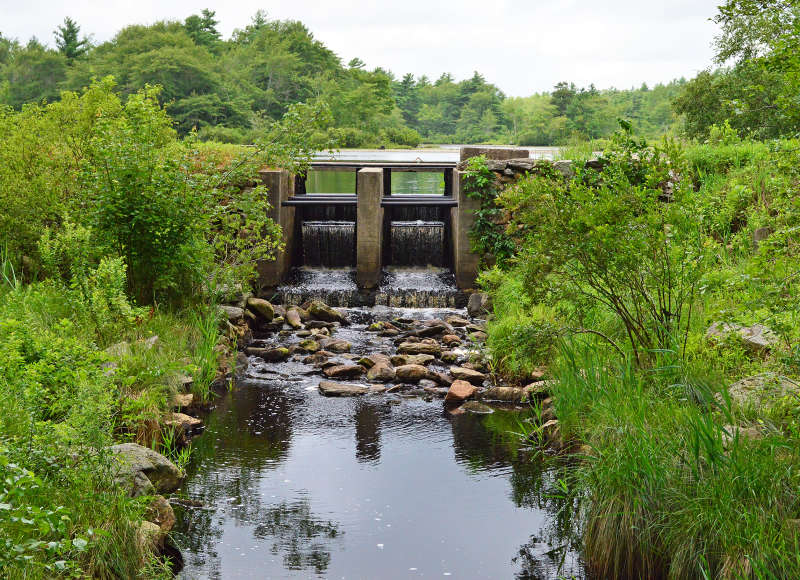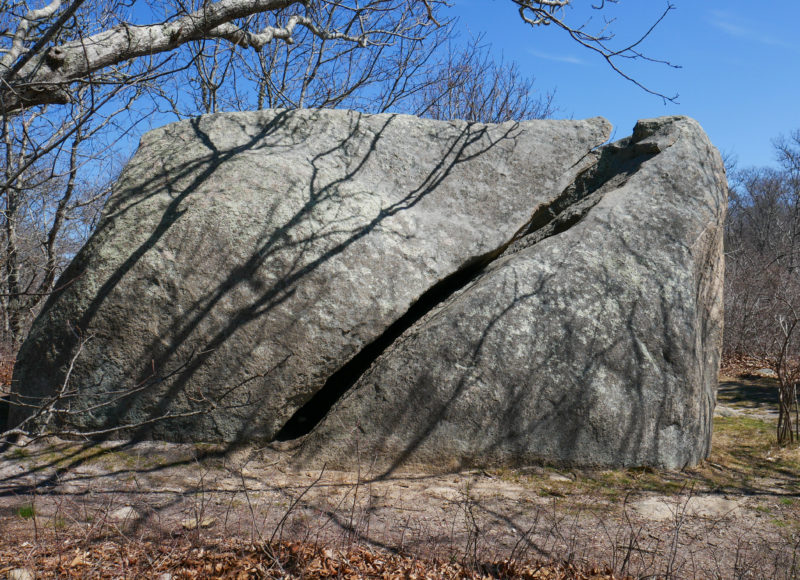Hunting is a great way to get out in nature and truly connect with where your food comes from, whether you’re duck hunting on the Bay’s salt marshes or following deer in its quiet forests. Around Buzzards Bay, hunting is open for several different species seasonally, including rabbits, deer, turkey, upland game birds, and waterfowl. Be sure to follow Massachusetts state regulations to ensure you’re following harvest limits and taking only what’s in season, which helps to preserve our area’s vital biodiversity.
Licensing & Training
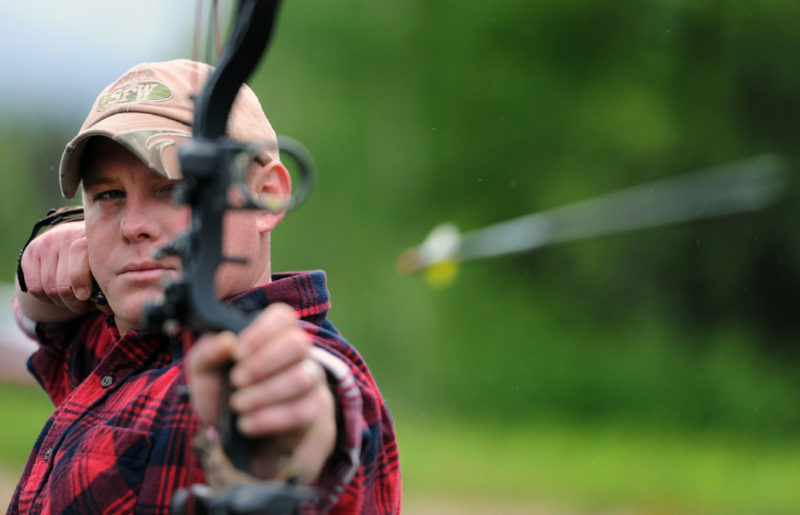 Massachusetts requires that all hunters above age 15 obtain a state hunting license. If you held any hunting or sporting license before January 1, 2007, you are automatically eligible for your license. Everyone else must earn a government-issued Basic Hunter Education Certificate offered by any U.S. state, Canada, or Mexico. This certificate is awarded after completing a free in-person course, which can be between 2 and 6 days in length, or an independent study session. For those interested in archery, we recommend taking an additional bowhunter education course.
Massachusetts requires that all hunters above age 15 obtain a state hunting license. If you held any hunting or sporting license before January 1, 2007, you are automatically eligible for your license. Everyone else must earn a government-issued Basic Hunter Education Certificate offered by any U.S. state, Canada, or Mexico. This certificate is awarded after completing a free in-person course, which can be between 2 and 6 days in length, or an independent study session. For those interested in archery, we recommend taking an additional bowhunter education course.
State law allows that minors between ages 12-14 can hunt alongside a licensed hunter 18 years of age or older. The licensed hunter and the minor must share a single firearm/bow, and they are together restricted to the bag limit for one individual.
Youths ages 15-17 can also hunt with a certified hunter age 18 or older. Or, they can legally hunt without supervision if they obtain a Basic Hunter Education certificate. Either way, youth ages 15-17 must have a minor hunting license, which can only be purchased at MassWildlife offices or from specific vendors.
Once you have your hunting license, you may also have to obtain specific permits and stamps depending on the type of hunt. These include an archery stamp, a primitive firearms stamp, a waterfowl stamp, an antlerless deer permit (when issued), and a turkey permit. Migratory birds, such as ducks and geese, are federally managed and require a federal duck stamp. The fees for these stamps and permits goes to help fund land conservation purchases across the state, ensuring the continued protection of land for hunting and all forms of outdoor exploration.
How to Get Started
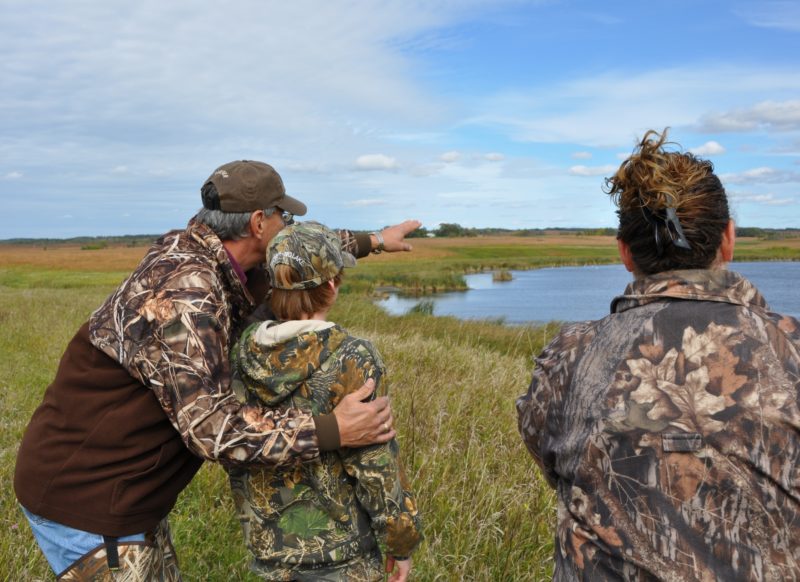
If you didn’t learn to hunt as a kid, it can seem intimidating to get into the sport as an adult. But with a little patience and willingness to learn, anyone can take part in this vibrant and varied sport.
Here are a few tips to get started.
1. Do your research
Hunting is all about getting out of the house and connecting with the great outdoors. Before you step out your front door, however, it will help to narrow down your interests. Do you want to track deer through the woods, or wait for ducks beside a scenic salt marsh? Are you interested in archery, trapping, or hunting by shotgun? Narrow down your interest to help focus the additional training and research you need to do in order to get started, as well as any gear you may need to buy.
2. Take additional classes
Completing your Basic Hunter Education is a required part of starting off your education as a hunter, but if you’re starting from scratch, it may not cover all of the skills you need to go on your first hunt. MassWildlife Learn to Hunt Programs can help fill in the gaps, providing the training needed to pursue different types of game.
You will likely also find it helpful to take classes in skills that will better help you navigate the habitats where you hunt. These skills may include orienteering, wilderness survival, ecology, or tracking. Many organizations throughout New England, including local gear outfitters, offer courses in these outdoor skills.
Women hunters should check out the Becoming an Outdoors-Woman (BOW) program, offered by the Massachusetts Division of Fisheries & Wildlife. This program provides training in an assortment of valuable outdoor skills – from bow and shotgun skills to map and compass usage, game cooking, woodland tracking, and much more.
3. Get familiar with hunting ethics
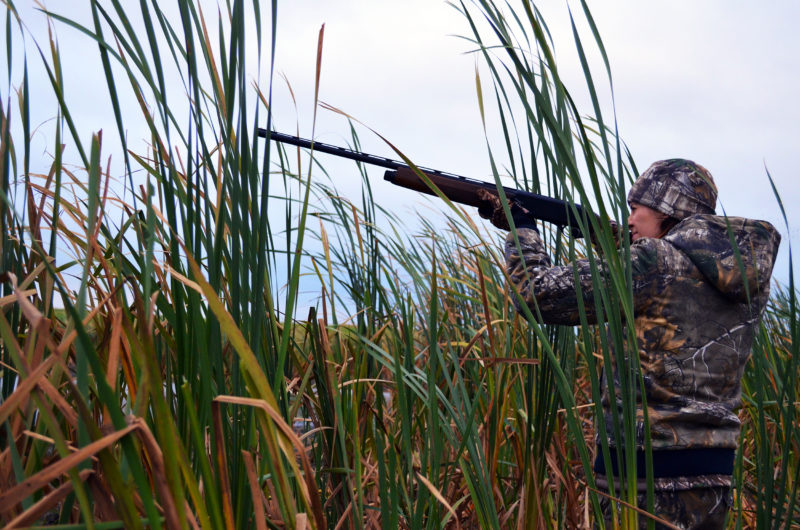 Ethical hunting means going above and beyond the laws that govern your activities. Ethical hunters care for the lands and wildlife that make hunting possible. Ethical hunters also act as a good ambassador for the sport, and in doing so ensure that hunters remain welcome in the broader community and hunting lands stay open.
Ethical hunting means going above and beyond the laws that govern your activities. Ethical hunters care for the lands and wildlife that make hunting possible. Ethical hunters also act as a good ambassador for the sport, and in doing so ensure that hunters remain welcome in the broader community and hunting lands stay open.
Hunter’s ethics will be part of your Hunter Education Course, but you should continue to think about and evaluate hunting ethics throughout your time in the sport. As you have different experiences in the field, consider if your behavior aligns with hunting ethics, and how it will impact the animals, habitats, and other humans around you.
4. Connect with the community
The best way to learn about hunting is to draw from the wide breadth of knowledge held by your fellow outdoorsmen and women. You can connect with more experienced hunters at classes like those mentioned above, or by becoming a member of a hunting community organization. These organizations often provide meetings, workshops, and other events that can provide continuing learning experiences.
Most communities have local sportsman clubs or rod and gun clubs where you can meet and learn from experienced hunters. These clubs are also great places to practice your shooting before heading out into the field for hunting season.
Once you have gotten to know hunters in your area, we also recommend asking if you can shadow someone hunting in a method that interests you. Don’t bring along any gear of your own just yet – focus on following, watching, and most importantly, asking questions.
Bay Hunting Community Groups:
- New England Chapter of Backcountry Hunters & Anglers
- Massachusetts Chapter of Ducks Unlimited
- Fall River Rod & Gun Club, Tiverton, RI
- Tiverton Rod & Gun Club, Fall River
- Buckley Family Archery, Fall River
- Middleboro Sportsmen’s Club, Middleborough
- Wankinquoah Rod & Gun Club, Middleborough
- Reedy’s Archery, Middleborough
- Rod & Gun Club of New Bedford, North Dartmouth
- New Bedford Revolver & Rifle Club, New Bedford
- Fin, Fur and Feather Club, Mattapoisett
- Sippican Rod & Gun Club, Rochester
- Carver Sportsmen’s Club, Carver
- Monument Beach Sportsman’s Club, Bourne
- Falmouth Rod & Gun Club, Falmouth
- Martha’s Vineyard Rod & Gun Club, Edgartown
5. Spend time in the field
Once you’re feeling confident in your interests, your outdoor skills, and any gear that you’ve purchased, take it all outside for a few test runs before your first hunt. Get to know the trails you’ll be walking. Learn how to move silently and carefully. Figure out how much gear you’re comfortable carrying for long periods, and if there’s anything you’ve forgotten. And most importantly, take time to stop and observe the habitat and the animals you’ll be pursuing within it. Pay attention to the paths that deer travel, the corners where waterfowl like to hang out, and the way everything around you changes with the time of day and the seasons.
Scouting habitat and animal movement patterns can be done all year long, and plays in important part in the success you will have during the hunting season. Even once you’ve become a seasoned hunter, taking time to observe will be an invaluable part of growing your knowledge of and connection to the places where you hunt – making you even better at the sport.
6. Practice!
Over the months and years you spend outdoors, you will continue to gain wisdom and see improvements in your skills. Like any sport or hobby, hunting takes time and practice to get good! And like any other sport or hobby, there’s no point at which you ever stop learning.
Safety & Regulations
Hunting remains an extremely safe way to experience the outdoors. However, it’s important for all hunters to be aware of the potential risks that the sport can pose, for both themselves and others. Your hunting training will provide a great background in the best ways to stay safe in the outdoors. In addition, we recommend regularly reviewing firearms safety recommendations. If you plan to use treestands for hunting, Massachusetts Fisheries & Wildlife has also compiled a useful treestand safety guide to help you stay safe.
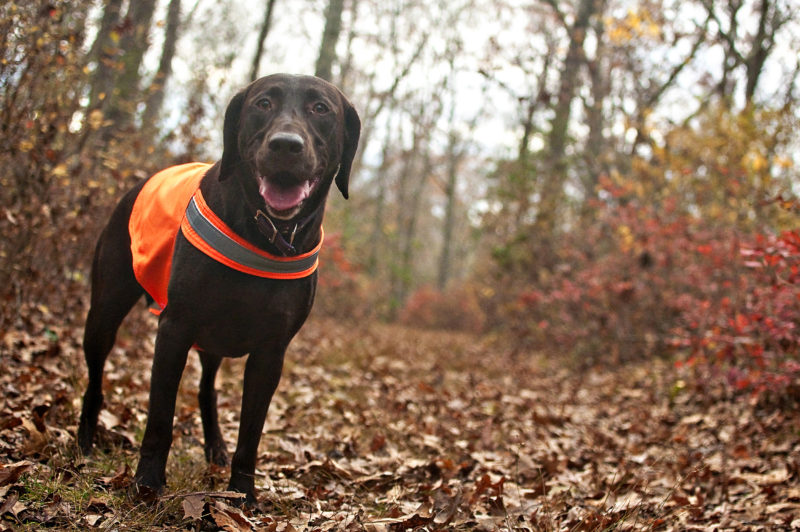
Your dog, too, should wear a blaze orange vest in the woods during hunting season.
Annually, all hunter should review the state hunting season dates, as they can change year by year.
Blaze orange clothing is also a vital piece of your hunting gear, which will make the sport safer for you and for others. During many hunting seasons, this color is legally required. All hunters during shotgun deer season, and all deer hunters during primitive firearms season, must wear at least 500 square inches – roughly the size of a vest or a backpack – of blaze orange. (This rule does not apply to coastal waterfowl hunters in a blind or boat.)
During pheasant or quail season, hunters on state Wildlife Management Areas where these game birds are stocked must wear a blaze orange hat or cap. (This rule does not apply to waterfowl hunters in a blind or boat, as well as raccoon and opossum hunters at night.)
Learn More:
- Massachusetts State Hunting Regulations: https://www.mass.gov/hunting-regulations
- MassWildlife Lands Viewer: https://www.mass.gov/how-to/masswildlife-lands-viewer
- Official Hunter Safety Courses: https://www.hunter-ed.com/
- Bowhunter Safety Courses: https://www.bowhunter-ed.com/
- U.S. Fish & Wildlife Service Hunting Center https://www.fws.gov/refuges/hunting/
Places To Go
History and nature abound at Tripps Mill, a scenic trail and fishing spot on Tinkham Pond in Mattapoisett.
Parking: Small gravel parking area on Acushnet Road
Facilities: None
The mix of open meadows, woodland paths, and sweeping ridge-line views at Waskosim's Rock Reservation make it a fascinating place to visit and re-visit.
Parking: Medium-sized dirt parking area
Facilities: None
